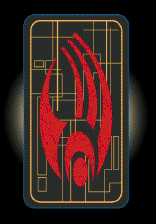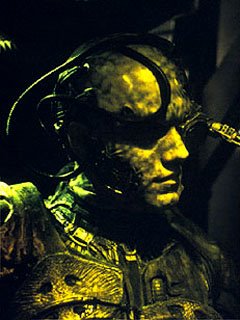RESISTANCE IS FUTILE!

This is about one race in the Star Trek Universe. The one race that is all about order and collectiveness. My kinda race. :p

Borg
Origin: Delta Quadrant. A cybernetic life-form thousands of years old which is part organic, part artificial life. They have advanced well beyond Federation science, unknown prior to a confrontation with the U.S.S. Enterprise NCC-1701-D arranged by the entity known as "Q" circa stardate 42761 ( 2365) some 7,000 light-years past explored Federation space in the Delta Quadrant.
The Borg have a singular goal, namely the consumption of technology, rather than wealth or political expansion as most species seek. According to their spokesman, in the form of an assimilated Captain Jean-Luc Picard, the Borg only want to "raise the quality of life" of the species they "assimilate." Androids, for example, they view as primitive and obsolete. Born humanoid, they are almost immediately implanted with bio-chips that link their brains to a collective consciousness via a unique subspace frequency emitted by each drone. This collective consciousness is experienced by the Borg as "thousands" of voices — they are collectively aware, but not aware of themselves as separate individuals. Consequently, they never speak in singular pronouns, referring to themselves when required as merely "Third of Five," for instance.
The Borg ingest only energy to drive their technological system via an energy conduit port. Their bio-chips synthesize any organic nutrients needed. Among the many advantages their collective consciousness affords them, the Borg hive-mind allows for instantaneous adaptations to shield and phaser frequency modulations in combat; they are also able to regenerate and repair their massive cube ship with the power of their collective thoughts alone. The hive-mind drones do not register as individual life-signs when scanned, only as a mass reading and then at a bare minimum. The sick and injured are not healed but "reabsorbed" by the removal of the receiver piece, which leads to self-destructive dissolve. When shipboard during dormancy in their regenerative mode, power is minimal and the vessel's EM field cuts off. They have a knock-out drug or procedure for humans, using a drill-tap placed behind the left ear, that works immediately but wears off in less than a minute.
When "assimilating" their target species, The Borg usually air this message:
"We are the Borg. Lower your shileds and surrender your vessel. Existence as you know it, is over. we will add your biological and technological distinctiveness to our own. Your culture will adapt to service ours. RESISTANCE IS FUTILE!"


